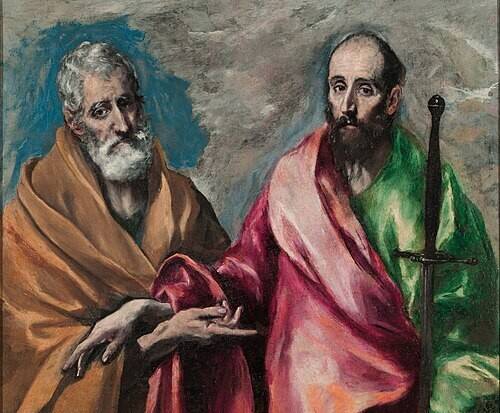A Homily for the Solemnity of Saints Peter and Paul, Apostles
Readings: Vigil Mass: Acts 3:1-10 Galatians 1:11-20 John 21:15-19
Mass of the Day: Acts 12:1-11 2 Timothy 4:6-8, 17-18 Matthew 16:13-19
We think of her as a poet—and a great one—but a case could also be made for her as a theologian. So many of Emily Dickinson’s poems are about encountering God in nature, in our daily lives and in our deaths.
One of her poems even mentions St. Peter, though it is not an encomium to the martyr. No, Dickinson addresses a question that most of us have put to God at one time or another: How could you let this happen to me?
The poet imagines us, after death, carrying our unexplained woes to Christ only to have him tell us that he, too, has known great sorrow—and at the hands of his own dear friends, companions like St. Peter.
I shall know why – when Time is over –
And I have ceased to wonder why –
Christ will explain each separate anguish
In the fair schoolroom of the sky –
He will tell me what “Peter” promised –
And I – for wonder at his woe –
I shall forget the drop of anguish
That scalds me now – that scalds me now!
Dickinson does not discount our troubles, but she does remind us that Christ bore them as well. We will not enter heaven telling the Lord, “You don’t know what it’s like down there!” No, at first sight of the Redeemer, we will realize that he has also known what it means to suffer, not only the physical assaults of his foes but also the heartbreak bestowed by bosom companions.
In the vigil Mass of this great solemnity, St. John records that before Jesus gives him the task of feeding the sheep, our Lord asks Peter to renew his love for him.
What we do not hear, from the same Gospel, is Peter’s earlier, three-fold denial of his friend and savior.
The maid who was the gatekeeper said to Peter,
“You are not one of this man’s disciples, are you?”
He said, “I am not” (18:17)
And then,
Simon Peter was standing there keeping warm.
And they said to him, “You are not one of his disciples, are you?”
He denied it and said, “I am not.”
One of the slaves of the high priest,
a relative of the one whose ear Peter had cut off, said,
“Didn’t I see you in the garden with him?”
Again Peter denied it. And immediately the cock crowed (18:25-27).
And on the day of this great solemnity itself, we hear
You are Peter,
and upon this rock I will build my Church (Mt 16:18).
Today, we do not read on in the Gospel of St. Matthew to hear Peter dismiss the very possibility of Christ suffering. Our Lord must say to him,
Get behind me, Satan!
You are an obstacle to me.
You are thinking not as God does,
but as human beings do (16:23).
Dickinson has it right. Christ in glory
will tell me what “Peter” promised –
And I – for wonder at his woe –
I shall forget the drop of anguish
That scalds me now – that scalds me now!
Of course, the church was built upon not one but two great pillars, Peter and Paul. Yet when we turn our attention to the Apostle of the Gentiles, St. Paul himself insists that we remember the whole story.
For you heard of my former way of life in Judaism,
how I persecuted the Church of God beyond measure
and tried to destroy it, and progressed in Judaism
beyond many of my contemporaries among my race,
since I was even more a zealot for my ancestral traditions.
But when God, who from my mother’s womb had set me apart
and called me through his grace,
was pleased to reveal his Son to me,
so that I might proclaim him to the Gentiles (Gal 1:13-16).
Let’s be honest. These two great pillars of the church were fashioned from troubled timbers. The triumph of Christ’s grace should console us when we evaluate our current church leaders or, better yet, examine ourselves.
Dickinson is, as always, insightful. Come the day of glory, the Lord will not have forgotten the grievances of earth. What we do here, for weal or woe, can be commuted by God’s grace, but it is never cancelled. The effects continue to ripple through time, like a violent stone thrown into still waters.
Yet on this solemnity, we can remember—along with our Savior—the failure to understand, the failure to give witness and the failure to love that marked the lives of these two great saints. We can recall all this without distress or disturbance because St. Paul, who could have been speaking for both apostles, told us, “I was rescued from the lion’s mouth (1 Tim 4:17).
What Dickinson so astutely grasps is that heaven still has its sorrows. Eternity does not cancel time. But by the grace of God, those sorrows, while they persist, no longer fester.
No, they are redeemed, transformed by Christ’s grace. St. Paul told the Romans
where sin increased, grace overflowed all the more,
so that, as sin reigned in death,
grace also might reign through justification for eternal life
through Jesus Christ our Lord (5:21).
To be honest, it will not take much for the Lord of Glory to put our troubles and sorrows into perspective. As Dickinson noted, so many a “drop of anguish” does not last out the week, much less a lifetime.
But what explanation will be needed when we see Peter and Paul and so many of our own flawed loved ones standing by the Savior’s side? Sins will still echo, but how faint they will sound amid shouts of joy.
Read next: ‘The Emily Dickinson poem about love you should read.’








